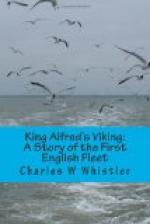Save in a few cases, where the original spelling preserves a lost pronunciation, as in the first syllable of “Eadmund,” the modern and familiar forms of the names have been used in preference to the constantly-varying forms given by the chroniclers. Bridgwater has no Saxon equivalent, the town being known only as “The Bridge” since the time when the Romans first fortified this one crossing place of the Parret; and the name of the castle before which Hubba fell varies from Cynuit through Kynwith to Kynwich, whose equivalent the Combwich of today is. Guthrum’s name is given in many forms, from Gytro to Godramnus. Nor has it been thought worth while to retain the original spelling AElfred, the ae diphthong having been appropriated by us to an entirely new sound; while our own pronunciation of the name slightly broadened as yet in Wessex, is correct enough.
The exact relationship of St. Neot to Alfred, beyond that he was a close kinsman, is very doubtful. He has been identified with a brother, Athelstan of East Anglia, who is known to have retired to Glastonbury; but there is no more than conjecture, and I have been content with “cousinship.”
C. W. Whistler
Stockland, 1898.
Chapter I. The Seeking of Sword Helmbiter.
Men call me “King Alfred’s Viking,” and I think that I may be proud of that name; for surely to be trusted by such a king is honour enough for any man, whether freeman or thrall, noble or churl. Maybe I had rather be called by that name than by that which was mine when I came to England, though it was a good title enough that men gave me, if it meant less than it seemed. For being the son of Vemund, king of Southmereland in Norway, I was hailed as king when first I took command of a ship of my own. Sea king, therefore, was I, Ranald Vemundsson, but my kingdom was but over ship and men, the circle of wide sea round me was nought that I could rule over, if I might seem to conquer the waves by the kingship of good seaman’s craft.
One may ask how I came to lose my father’s kingdom, which should have been mine, and at last to be content with a simple English earldom; or how it was that a viking could be useful to Alfred, the wise king. So I will tell the first at once, and the rest may be learned from what comes after.
If one speaks to me of Norway, straightway into my mind comes the remembrance of the glare of a burning hall, of the shouts of savage warriors, and of the cries of the womenfolk, among whom I, a ten-year-old boy, was when Harald Fairhair sent the great Jarl Rognvald and his men to make an end of Vemund, my father. For Harald had sworn a great oath to subdue all the lesser kings in the land and rule there alone, like Gorm in Denmark and Eirik in Sweden. So my father’s turn came, and as he feasted with his ninety stout courtmen, the jarl landed under cover of the dark and fell on him, surrounding the house and firing it. Then was fierce fighting as my father and his men sallied again and again from the doors and were driven back, until the high roof fell in and there was a sudden silence, and an end.




